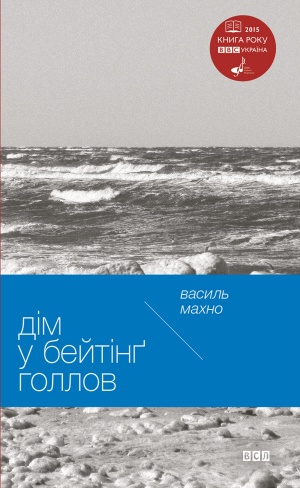Vasyl Makhno
(Василь Махно)
Vasyl is the author of twelve collections of poetry, two essay collections, and a forthcoming novel. His first book of fiction, the short story collection The House in Baiting Hollow, earned him the 2015 BBC Book of the Year Award (Ukraine). He is the recipient of multiple other literary awards and prizes, both in Ukraine and abroad, including the Morave International Poetry Prize (Serbia), the Order of Merit (Ukraine), and the Kovaliv Fund Award (USA). Vasyl’s work has been translated into twenty-four languages. Individual books of his—sixteen in total—are available in English, German, Polish, Serbian, Hebrew, Russian, and Romanian. In English, Vasyl’s poetry and essays have been published widely in journals such as Agni, Krytyka, Solstice, and Hawaii Review, as well as in anthologies published by Black Lawrence Press and Academic Studies Press. He is a native of the small Western Ukrainian town of Chortkiv and its environs, and has been living in New York City since 2000. An insatiable traveler, Vasyl holds a PhD in Literature from the National Academy of Sciences of Ukraine.
Born 1964 in Chortkiv, Ukraine.
Currently resides in New York City.
The House in Baiting Hollow
2015 BBC Book of the Year
A collection of eight longer stories, The House in Baiting Hollow is a lyrical exploration of the idea of home—its impermanence, its memory, and its potential multiplicity. Rooting the collection in his two hometowns of Chortkiv in Western Ukraine and New York City, Makhno weaves the reader back and forth, both spatially and temporally, through his own experiences of home. Four of the stories take place in Chortkiv—where Ukrainians, Poles, Jews, and Roma once lived side by side—and echo like calls from the country’s and author’s own polyphonic pasts. The remaining four stories take place in the multiethnic, multisensory, noisome, and ever-present New York City, which Makhno has learned to call home. The elderly Susan in Long Island reliving troubling memories from her youth, the Zalzinger brothers divided by an ocean traversable only by ship, the immigrant Genyk and Zenyk finagling for permanent residency—these characters, all utterly American on some level, rise unobtrusively from the pages as the reader is pulled on the author’s odyssey both away from and toward home.
Translation sample available upon request.
Full German translation available.
Key words: literary fiction, short stories, memory, migration, home, NYC, Chortkiv
Original publication: «Дім у Бейтінг Голлов», Old Lion Publishing, 2015
Anticipated word count: 47,500
English rights holder: Old Lion Publishing
Letters and Air
Makhno’s talent for lyrical prose and his heritage as a poet are exemplified in this collection of eleven essays, compiled from two of his books, Horn of Plenty and Bicycle. The first portion of the collection is inspired by the author’s childhood and adolescence in late-Soviet Ukraine—in the town of Chortkiv and the cities of Kryvyi Rih and Ternopil—and delves into Ukraine’s multiethnic, multistate, and multi-war history. The second portion of the collection explores Makhno’s own experiences as a writer in various cultural settings: as a resident of the U.S. and at literary events in Nicaragua, Colombia, Serbia, and Israel. As an incredibly well-traveled and historically informed writer, his awareness of the role of language in an author’s life and his appreciation for the impossible disentanglement of language from a locale’s culture, geography, topography, and ethnic and political history play central themes in these latter essays. The entire collection, on a certain level, reads as a travelogue, of both the author’s own life and the places he has visited. As the reader journeys temporally and spatially with ease and fluidity, in hallmark Makhno fashion, preconceived notions of time, place, memory, and space are challenged and redefined.
Partial translation available.
Key words: creative nonfiction, essays, travel, memory, literature, language, history
Original publication: «Котилася торба», Krytyka, 2011; «Ровер», Krok, 2015
Anticipated word count: 88,500
English rights holder: Author


